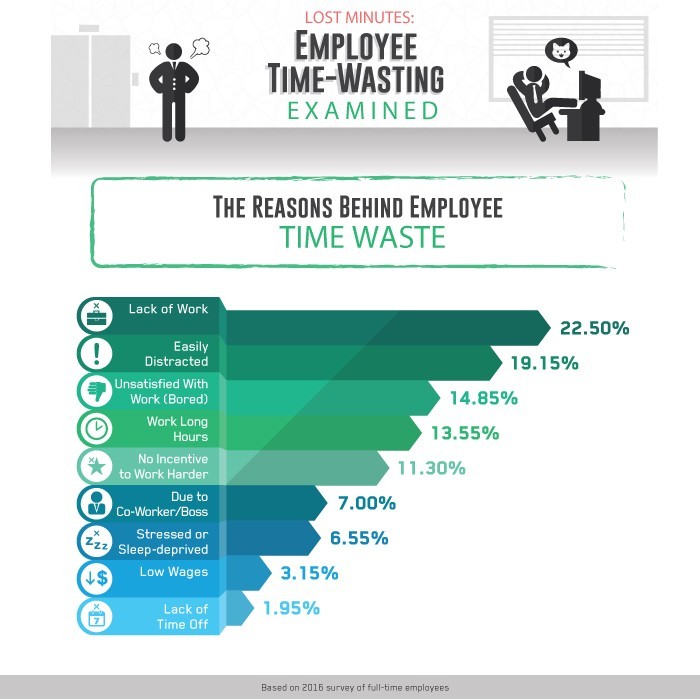Your workday. It’s the perfect opportunity to hone your skills, boost your productivity, and…surf the internet? To get the inside scoop on who’s really wasting the most time at work, we surveyed 2,000 full-time employees in various industries across the U.S.
Which industry’s workers waste the most time? How do job role, education level, exemption status, and generation factor in? Which regions are home to the most–and least–productive workers? And which solutions could actually combat the issue? Keep reading for the uncensored details.
Which Industry's Workers Waste the Most Time?
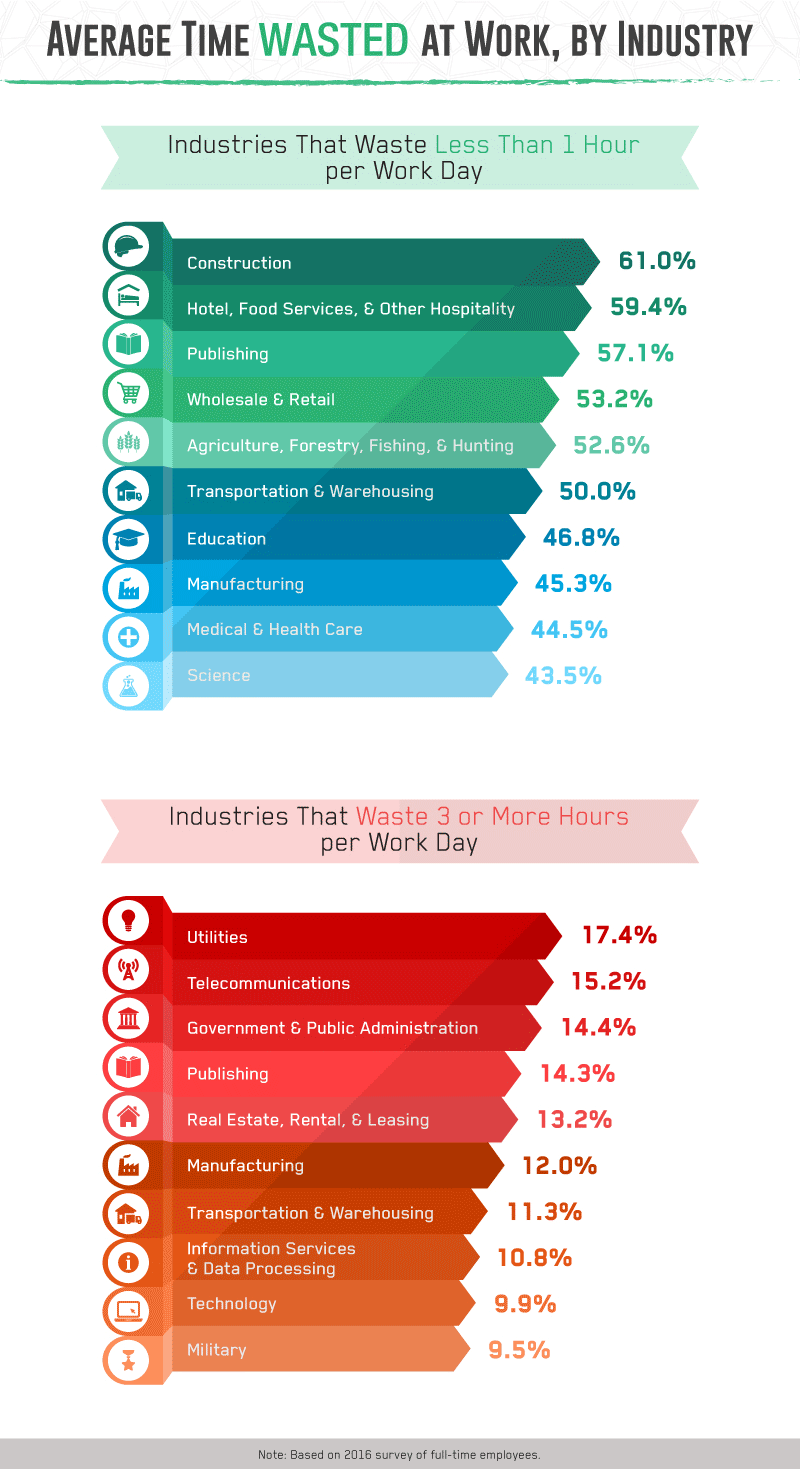
Our survey revealed that workers in certain industries appear less likely to waste time at work. People who work in construction are likeliest to have their noses to the grindstone–61% say they squander less than an hour during the workday. Why? One possibility is that the industry is notoriously stressful for workers (with a shortage of qualified labor, tight deadlines, and frequent delays), wasting time would only exacerbate these issues. People in hospitality, publishing, and wholesale/retail are also sticklers for staying on task.
Who’s notorious for frittering away the hours at work? Over 17% of workers in the utilities industry admit to wasting three or more hours each day. People in the telecommunications, government/public administration, and–once again – publishing industries also ’fess up to whiling away three-plus hours per workday.
Wasting Time: Job, Exempt Status, and Education Level
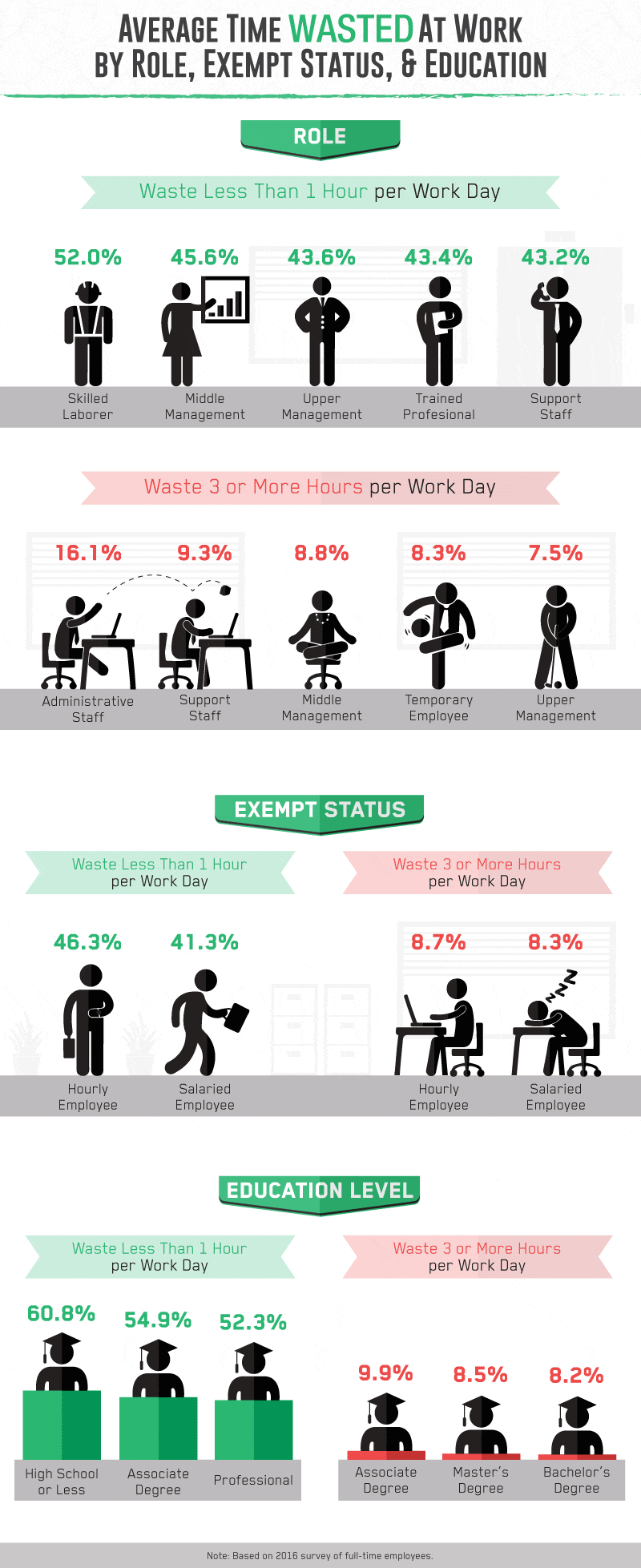
Next, we added job role, wages, and education level into the equation. As for workplace roles, over half of skilled laborers say they waste less than an hour a day, and nearly as many middle and upper management personnel say the same. On the other hand, over 16% of administrative staff members admit they waste three-plus hours a day. Around 9% of support staff and middle management say the same.
Hourly employees are slightly more likely than salaried employees to minimize workplace time-wasting (46% compared with 41%), but they’re just about as likely to waste time too. Interestingly, the penchant for staying on task decreases as education levels increase: Almost 61% of high school–educated workers waste less than an hour a day, while only 52% of those with professional degrees say the same. On the other hand, almost 10% of people with associate degrees come clean about wasting three or more hours.
Time Waster: Internet Surfing
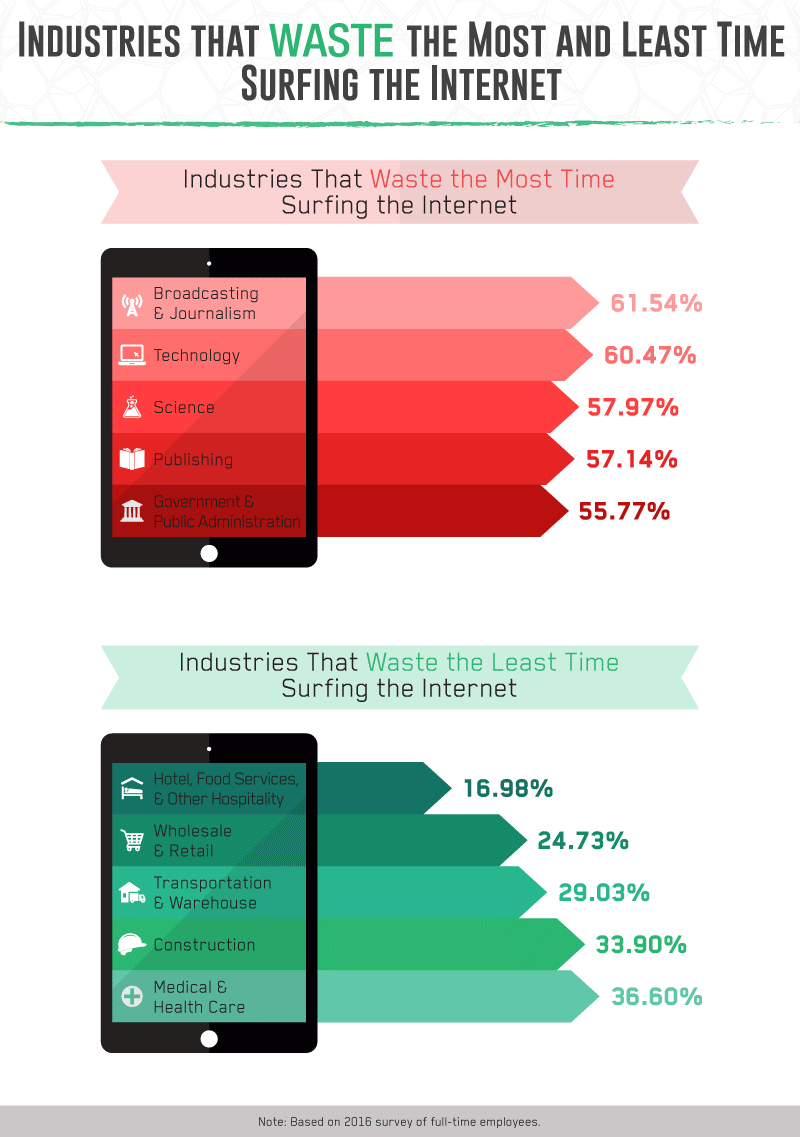
There’s certainly no shortage of ways to waste time at work, and one favorite activity is surfing the internet–aka “cyberloafing.” After all, who can resist the lures of breaking news, viral videos, and photos of cats?
The industries most susceptible to the call of the web: broadcasting and journalism, technology, science, publishing, and government and public administration. Around 6 in 10 workers in these industries scroll around online. Because many of these workers are at their computers most of the day, it's possible internet surfing is more enticing than other non-work activities, such as taking a walk or chatting with a co-worker.
The good news? A recent study reveals that surfing the internet at work can actually refresh workers and increase productivity.
Which Regions Surf the Internet at Work?
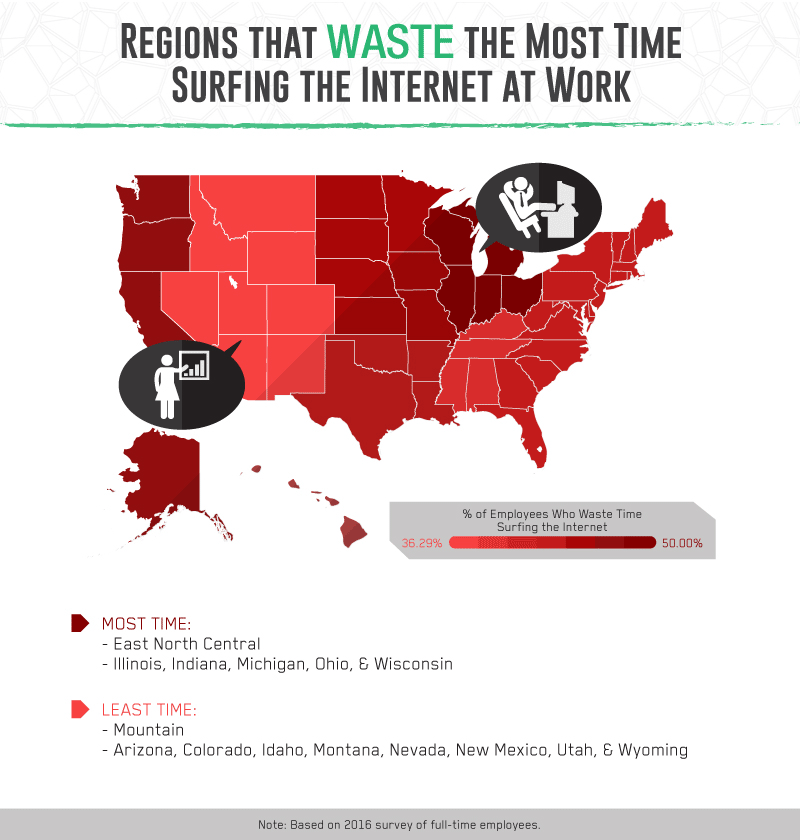
Mapping the locations of notorious cyberloafers yields some intriguing regional trends. Workers across the Pacific and East North Central regions confess to copious amounts of internet surfing at work. However, workers least likely to double-click the day away reside in the Mountain region. The East Coast falls in the middle of the pack.
Which Methods Reduce Wasted Time
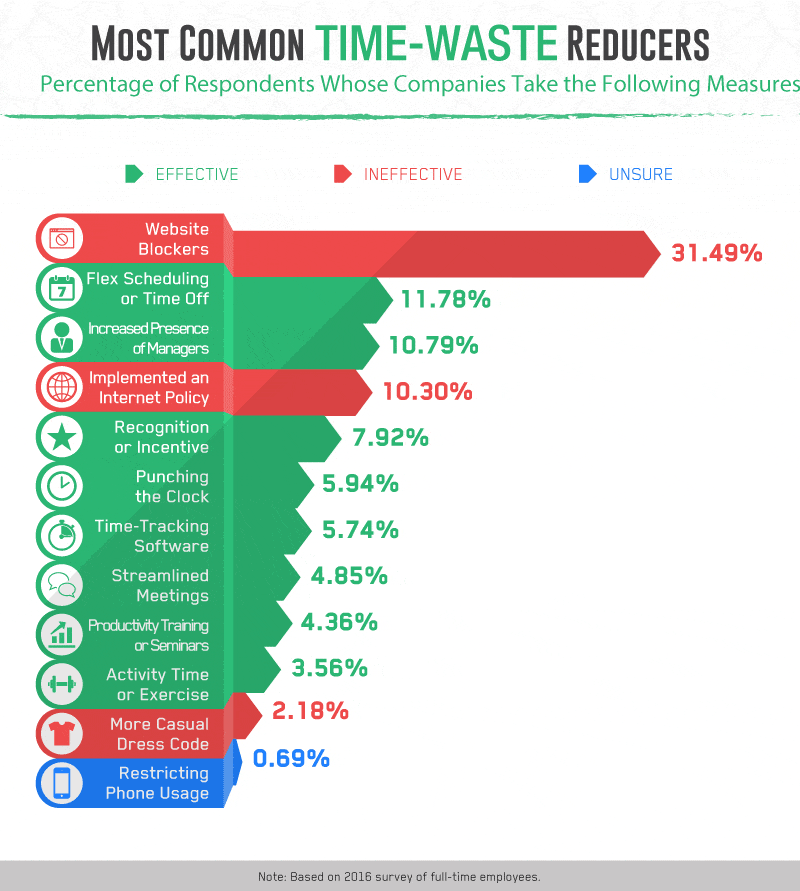
Many employers implement certain policies in hopes of cutting down on workplace time-wasters. We surveyed employees about the most common methods used by their employers, and asked the respondents to rate their effectiveness.
The most common policy is installing website blockers to prevent access to certain sites (a tactic used by over 31% of bosses). Workers deemed this ineffective, and some experts advise against it as it may simply prompt workers to use their smartphones instead, potentially leading to even more wasted time.
Some of the most commonly used methods are overarchingly positive as opposed to restrictive. For instance, flexible schedules, increased manager presence, and recognition or incentive are positive employee perks. But while workers proclaimed these effective, they said the same about more businesslike methods, such as punching a clock, using time-tracking software, and attending productivity training.
Each Generation's Time Wasters
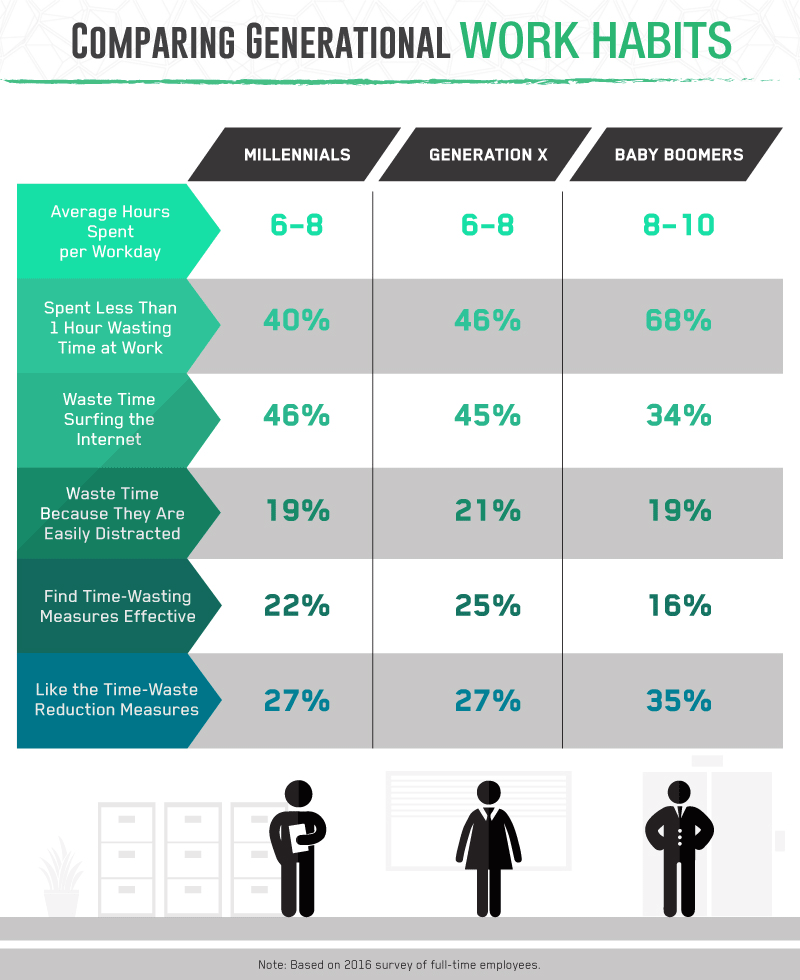
The graphic above breaks down work habits among three generations: Millennials (born 1982 to 2004), Generation X (born 1963 to 1981), and Baby Boomers (born 1946 to 1962). Overall, Baby Boomers worked the most hours and wasted the least time. Although fewer of them deemed workplace time-wasting reducers effective, they were also most likely to appreciate these measures.
Millennials edge out Gen Xers for the dubious achievement of wasting the most time at work, and they’re the least likely generation to deem effective the policies designed to combat time-wasting. Generation X workers fall in the middle, though they’re more closely aligned with Millennials than Boomers.
Hardest Workers by Generation, Industry, and Education Level

When it comes to workers of each generation, industry, and education level, who's working harder than the rest? Over half of Baby Boomers work eight-plus hours a day, and only 4.3% work four or less–meaning Boomers beat out Gen Xers and Millennials when it comes to hours worked.
Over half of people in the military and construction industries work eight or more hours per day, while people who work in real estate, utilities, and government are the aptest to work four or less hours a day. More than half of people with doctorate degrees and trade/technical training work eight-plus hours a day. On the other hand, over 6% of workers with associate, bachelor's, and master’s degrees tend to toil for four or less.
When it comes to workers of each generation, industry, and education level, who's working harder than the rest? Over half of Baby Boomers work eight-plus hours a day, and only 4.3% work four or less–meaning Boomers beat out Gen Xers and Millennials when it comes to hours worked.
Over half of people in the military and construction industries work eight or more hours per day, while people who work in real estate, utilities, and government are the aptest to work four or less hours a day. More than half of people with doctorate degrees and trade/technical training work eight-plus hours a day. On the other hand, over 6% of workers with associate, bachelor's, and master’s degrees tend to toil for four or less.
Hardest Workers by Region
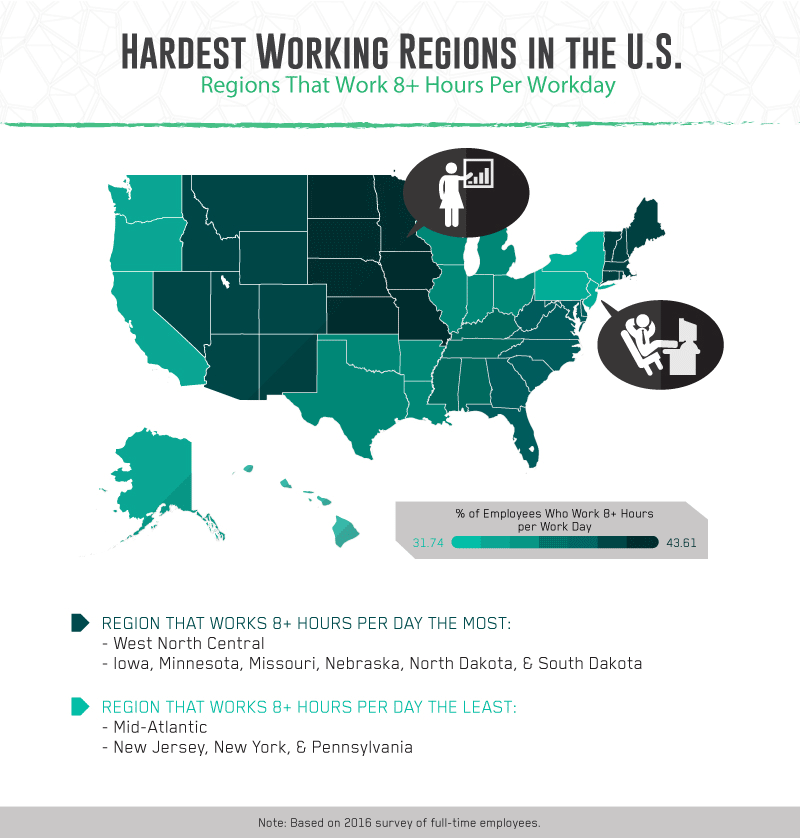
Which parts of the country are home to the hardest workers? People in the West North Central region are most likely to work eight or more hours a day. Those in New England and the Mountain region also rank high on the hardworking scale. Workers in the Mid-Atlantic region, on the other hand, are least likely to clock an eight-hour day. Personnel in the Pacific region follow close behind when it comes to the knocking off work early.
Boost Your Workplace Productivity
As our survey reveals, there’s little doubt that distractions can beckon during the workday. However, wasted hours mean wasted time, and we all know that at work, time is money. From boosting employee engagement to encouraging breaks to refresh, various methods may combat employee time-wasting. The key is to find the right fit for your unique workplace.
Want to increase your productivity at work? Visit Paychex.com to discover solutions for payroll services, HR services, 401(k) and benefits administration, and much more. As an industry leader in Human Capital Management, we can tailor a plan just for your business, and free you up to focus on other priorities.
Methodology
We surveyed over 2,000 full-time employees in the United States about their work habits.
Sources
10 trends defining the construction industry, Construction Dive, 2015.
You’re ‘cyberloafing’ right now. Here’s how your employer might stop that one day, Boston.com, 2016.
Web Surfing at Work Has Its Benefits, University of Cincinnati, 2014.
How to keep employees from wasting time, Financial Management Magazine, 2014.
Wasting Time At Work: The Epidemic Continues, Forbes, 2015.
